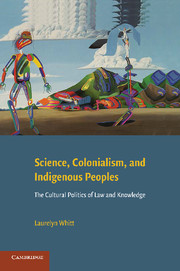Book contents
- Frontmatter
- Contents
- Preface
- Acknowledgments
- First Words
- PART I BIOCOLONIALISM AS IMPERIAL SCIENCE
- PART II THE HUMAN GENOME DIVERSITY PROJECT: A CASE STUDY
- PART III LEGITIMATION: THE RULE AND ROLE OF LAW
- 6 The Commodification of Knowledge
- 7 Intellectual Property Rights as Means and Mechanism of Imperialism
- 8 Transforming Sovereignties
- Conclusion – The Politics of Knowledge: Resistance and Recovery
- Bibliography
- Index
- References
7 - Intellectual Property Rights as Means and Mechanism of Imperialism
Published online by Cambridge University Press: 04 August 2010
- Frontmatter
- Contents
- Preface
- Acknowledgments
- First Words
- PART I BIOCOLONIALISM AS IMPERIAL SCIENCE
- PART II THE HUMAN GENOME DIVERSITY PROJECT: A CASE STUDY
- PART III LEGITIMATION: THE RULE AND ROLE OF LAW
- 6 The Commodification of Knowledge
- 7 Intellectual Property Rights as Means and Mechanism of Imperialism
- 8 Transforming Sovereignties
- Conclusion – The Politics of Knowledge: Resistance and Recovery
- Bibliography
- Index
- References
Summary
Indigenous peoples have linked their quest for self-determination to the protection of their knowledge.
– Chidi OguamanamThe means of justifying the new imperial science are inseparable from the means of its extension; the “rule of law,”– or as it is also known, the “supremacy of law,” – accomplishes both. Law is, Alan Hunt maintains, a “primary agency of the advance of new modalities of power and constitutes distinctive features of their mode of operation.” The imposition of the “rule of law” by a dominant nation-state upon other peoples was a classic means of extending empire, part of the process of colonization. This was, and remains, especially true of property law. Indeed, the politics of property has long been the central historical dynamic mediating the relationships between indigenous peoples and imperial states. Whereas sovereignty over indigenous lands was typically justified by appeal to three international legal theories of territorial acquisition – occupation, conquest, and cession – acquisition of less tangible indigenous resources – cultural, intellectual, and genetic – is now widely legitimated by appeal to intellectual property laws.
Intellectual property policies are justified in the U.S. Constitution on utilitarian grounds as a means “to promote the progress of science and useful arts.” Yet the lack of evidential support for the claim that patents and copyrights indeed effectively promote these ends has been noted.
- Type
- Chapter
- Information
- Science, Colonialism, and Indigenous PeoplesThe Cultural Politics of Law and Knowledge, pp. 157 - 178Publisher: Cambridge University PressPrint publication year: 2009



